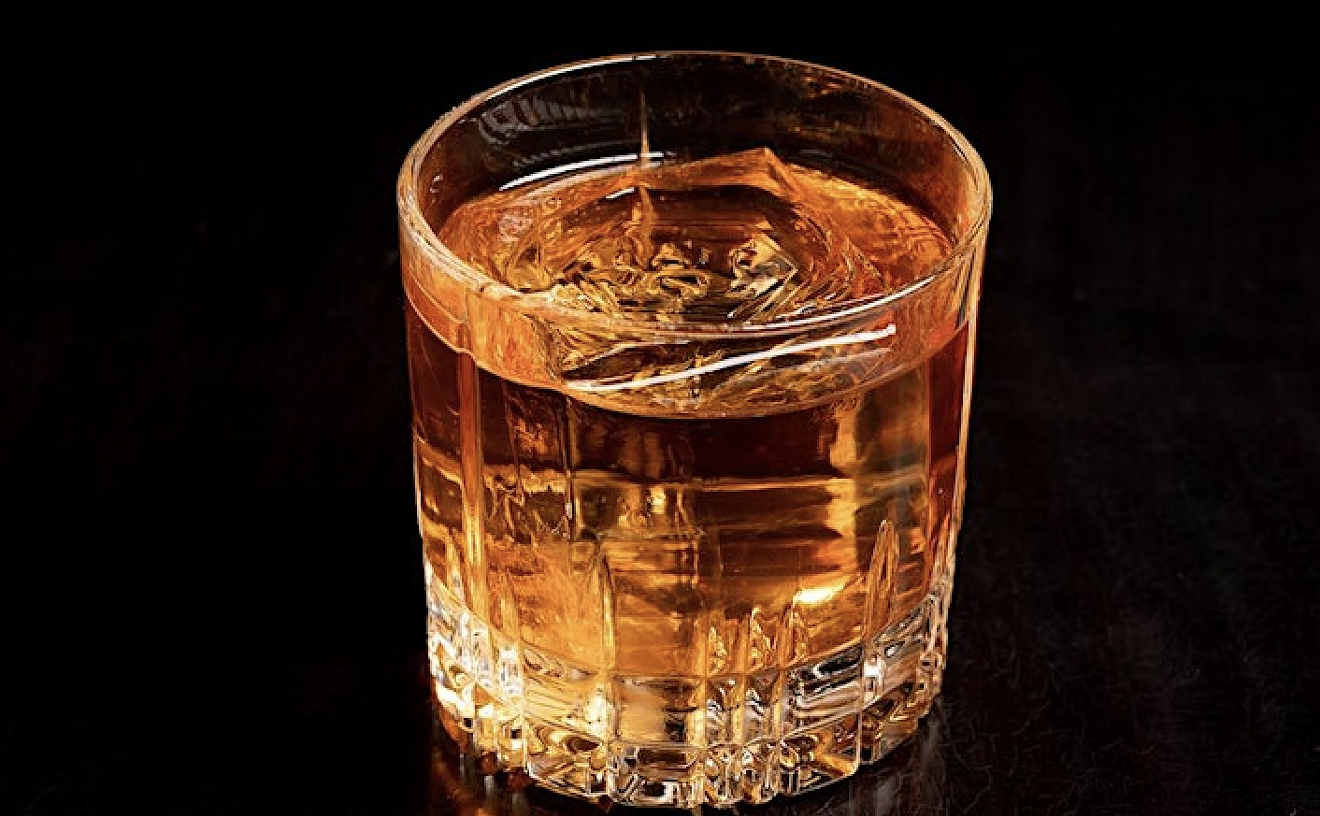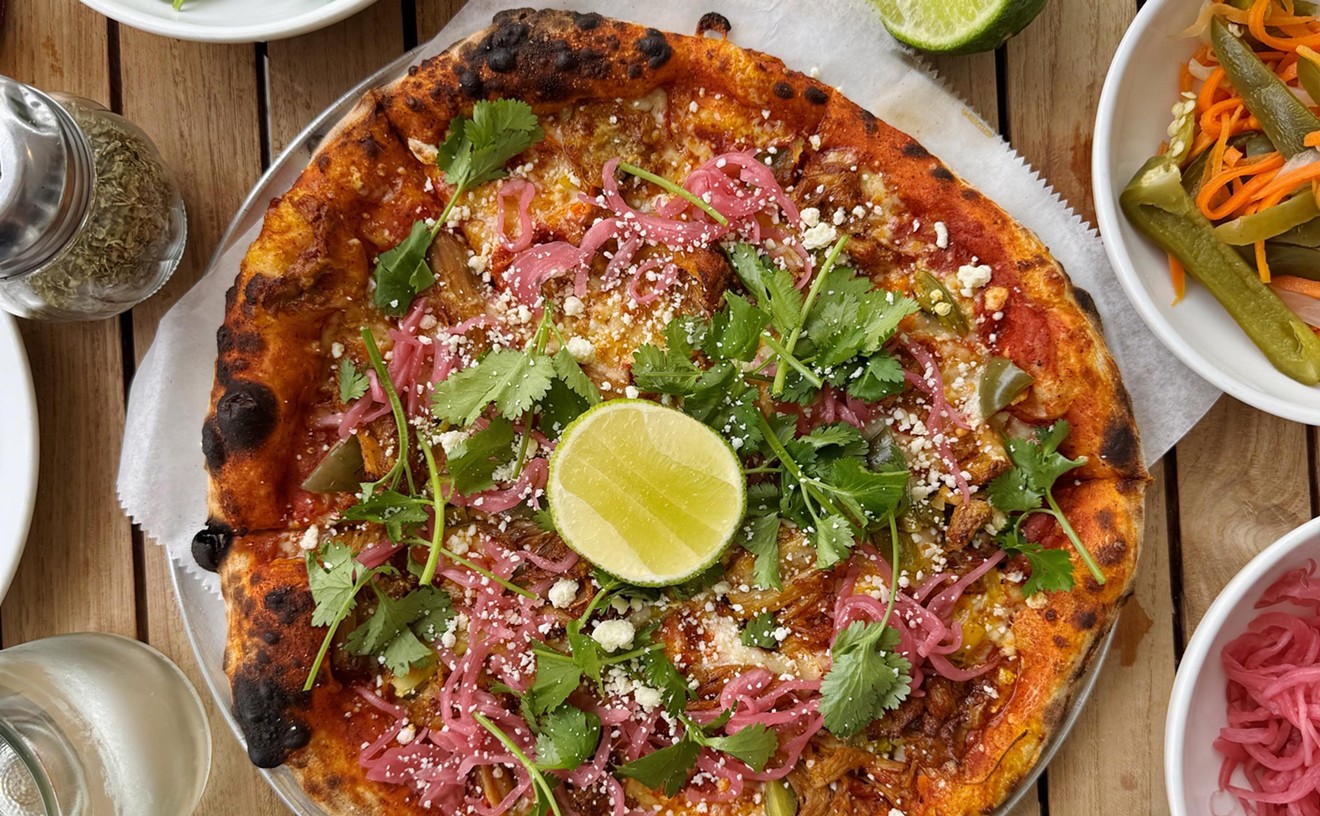The two at the table would have been manager Antoine Biccherai and his father Jean, a veteran restaurateur from Nice. I doubt they ever had such a conversation; still, mais non! What were they thinking? Who'd actually choose that tasteless, low-fat, whipped soybean-oil spread to go with their bread, and before indulging in a stream of cream-laden dishes at that?
Not a great way to introduce a meal. If this was their idea of an acceptable spread for bread, the fear that Velveeta would follow on top of the onion soup was not unfounded. Nor was the suspicion that this was a brasserie in name only.
The Riviera Brasserie opened last summer in the blossoming neighborhood now called Brickell Village. Perricones, the Provence Grill, and particularly Firehouse Four are contributing to an increasingly vibrant night scene, especially on Friday evenings when white collars from the nearby business district quench their post-work- week thirst. The Riviera is just a block away from the action, in the space formerly occupied by the Greenwich Cafe. The music is up front in the barroom, separated from the brasserie by a dark cloth curtain and a distinctly different ambiance. The bar itself is large and rectangular, surrounded by 28 stools, a pool table, two sports-filled TV screens, and a smattering of dining tables both inside and out. It's funky and informal, a place conducive to loosening one's tie and ordering a cold one.
This is how it should be, for the original brasseries of the 1500s were German breweries. Patrons would sit on long wooden benches at long wooden tables, drink ale, and eat plates of sauerkraut and oysters (though not necessarily together).
After the 1870 Franco-Prussian War, refugees from Alsace-Lorraine arrived in Paris and fashioned a new look for brasseries: elegant and ornately decorated, like the great cafes of that time. (The South Beach Brasserie does a nice job of recreating this style.) A brasserie was where writers, artists, politicians, and working people could eat, drink, write, argue, and play chess, all at the same table.
Today at the Riviera, the drink of choice resembles its French rather than German heritage. The wine list includes sixteen labels, mostly a French-American split, sold by the glass at pretty reasonable prices ($4-$7.50). The choice of imported beers, however, is a paltry three. Despite that dearth the Riviera is a better drinking establishment than an eating one.
Perhaps the mixed Franco-Prussian ancestry confused the owners, but none of the fare at this brasserie is particularly authentic, whether it be French, German, Italian, or American in origin. Back in the cafe the Parisian decor is typical enough: lots of dark wood and etched glass; pale yellow walls; those big Toulouse-Lautrec posters of the Moulin Rouge that are de rigueur for any bistro, cafe, or brasserie; and a wall of glass doors opening on to patio dining. (The indoor and outdoor seating capacity of the bar and restaurant is well over a hundred.) White butcher paper covered our cranberry-color tablecloth, upon which sat a vase of dried flowers and a flickering candle in a red glass, partially torn scanning sticker still stuck on.
The waiter started us off with an amuse-guele, a complimentary little preappetizer snack that in this case was oozy herbed-mozzarella cheese in a crisp phyllo triangle. French onion soup followed, and though there was no Velveeta on top, the slice of melted Swiss was so gooey and uncrusted that it may as well have been. The menu had actually promised "grilled mozzarella cheese," which would prove to be just the first in a long string of deceptive descriptions. (By the end of my dining experience here I came to accept that the menu was composed by a wily and wholly untrustworthy fellow.) Even so the cheese was the best part of the soup; the rest was inedibly salty. The problem, judging by the flavor, was too much Knorr's beef stock.
The Riviera runs one special entree each evening (usually seafood), which is served with soup for $9.95. There's also a $29.95 dinner special for two offering that same entree, soup or salad, and a bottle of wine. Otherwise pricing is moderate. We ordered the two most expensive starters (both at $11.90), the "salade Riviera" and salmon tartare. The former featured mango and avocado crescents circling the plate, with a centered mound of lightly dressed field greens and snow crab (applied so parsimoniously as to resemble a light dusting of snow). A fried scallion, black and curly, garnished the top. On the side was a saucer containing "cocktail" dressing that was really closer to Russian dressing: ketchup, mayo, and brandy.
The latter was a pleasant surprise. The salmon tartare was as ample as the crab was skimpy, a huge hamburger-shape patty of small-diced, scrumptiously fresh salmon marinated simply in lemon juice and olive oil. Sharing the plate was a curious bedfellow: a crouton with tomato, fresh mozzarella, and basil. I'm still not certain if I was supposed to place the salmon on top of the tomato-mozzarella toast, or eat them separately.
The menu trumpets a real salade niçoise with "lettuce, tomatoes, peppers, egg, black olives, anchovies, onions, and cucumbers" -- but no green beans or potatoes, two of the three main ingredients (along with tomatoes) in Auguste Escoffier's recipe published in 1921. Also, no mention of tuna. I asked the waiter whether tuna came with the salad, suggesting to him that such was usually the case. He responded with a shrug of the shoulders and a scrutiny of the menu, after which he agreed there was no mention of the fish, but if I said it came with the salad, then he guessed it did. It did. Solid white albacore, in thick wedges, on mixed field greens with a grain-mustard vinaigrette. Authentic salade niçoise is dressed in oil and vinegar, but in fact the vinegary mustard played well against the various ingredients.
There's an entire page of pasta entrees wherein you choose a shape of noodle and match it with a sauce: arrabiata, Alfredo, Bolognese, and so on. We paired the penne rigate with pesto, the slightly overcooked ridged tubes of pasta tossed with a forceful sauce of basil, garlic, and cheese; no pine nut flavor or texture to speak of. This dish was also cream-based, which pesto sauce does not by name imply (my, this menu guy is sly). The penne pesto wasn't bad, but unfortunately only reconfirmed my longstanding belief that if you want pasta, it's best to go to an Italian restaurant.
Of the two fish dishes offered, we skipped the grilled tuna with peppers and onions in favor of the more brasserielike salmon on a bed of "spinach salad" (turned out to be sauteed spinach) with boiled potatoes and "butter-herb sauce" (clarified butter with parsley). There was so much butter on the plate that my gripe about the lack of it with the bread basket seemed premature. The salmon, though, was beautifully grilled to near-translucence, and the accompaniments cooked to perfection.
Paris has been the home of French fries since at least the Sixteenth Century, when they were sold at stalls on the Pont Neuf. Classic cookbooks have since referred to a "pommes Pont Neuf" as a squat French fry, and the version at the Riviera is very much a classic: thick, rectangular sticks of golden fried potato, soft and steamy within. You can order them a la carte, but they also come alongside the New York steak with three-peppercorn sauce, reason enough to select this over the other version of the same meat, which comes with, yes, butter-herb sauce and regular, frozen fries. The steak was tender (though rarer than ordered), and bathed in a smooth brandy-cream sauce that tempered the piquant green, black, and pink peppercorns. About ten coin-size carrot slices came fussily piled into a pyramid shape next to the potatoes. What I prefer and would expect from an informal brasserie is for the carrots to slide from pan to plate: hot, untouched, and in gloriously random fashion.
The one thing the Riviera does consistently is confound expectations. I figured the hamburger "Eden Roc" would be something special, partly because they bothered to give it a name (after the Eden Roc hotel in Cap d'Antibes, where new chef Stephane Galiana worked prior to coming here), and also because it's the sort of food a brasserie normally serves. (The Brasserie in New York is famous for its burger, which weighs about a pound and costs about that weight in gold.) Sorry to say that the Eden Roc burger was the frozen preformed patty found in diners, coffee shops, and fast-food chains across America. Accompanying fries were not Pont Neuf, but skinny, crunchy, and abundantly portioned. "Fried onions" were supposed to come with the burger, but again that treacherous menu scribe tricked us into a raw deal: The onions were uncooked.
The cappuccino was excellent, as was a pear tart with a flaky, rectangular crust, a thin layer of custard, and caramelized slices of ripe pear. A more apropos finish to our meal, however, were the two small scoops of vanilla ice cream with dried apple, fresh apple, and apple syrup; the garnishings were delicious, the ice cream of the sort that's sold in the supermarket for 99 cents per metric ton. In other words, like the butter, inferior in quality and taste. What were they thinking?
Riviera Brasserie
901 S Miami Ave; 305-379-8988. Open for lunch Mon through Fri from 11:00 a.m till 3:00 p.m.; dinner Mon through Sat from 6:00 till 10:00 p.m.
Salade nicoise $7.95
Penne with pesto sauce $7.45
Grilled salmon $12.95
Steak with three-peppercorn sauce $19.95
Pear tart $5.
00










